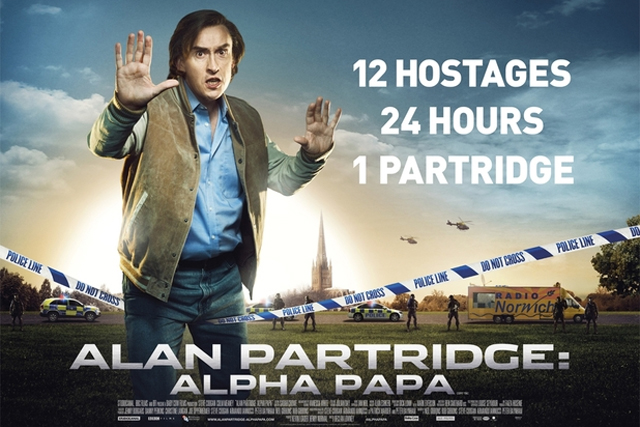
Try to describe to someone who doesn’t ‘get him’ (especially someone young, or not particularly au fait with the extremes of British comedy) exactly why Alan Partridge is such a comedic figure, and you’ll struggle to put your finger on it.
Adjectives thrown my way when asking Partridge-lovers what makes him so special included "cheesy", "mundane", and "moronic" – hardly descriptions that would convince non-fans to give him a go on the big screen.
In short, this meant that for Alpha Papa to top the UK Box Office as it did, it would need more than just the ticket sales of those already enamoured with Coogan’s comic creation. It would need a very good marketing drive too – and that’s exactly what it got.
First came the release and instant viral spread of northnorfolkdigital.com, the faux website of Alan’s employers. A textbook 1990s web design was complimented with cringeworthy photography, satirical banner ads for
Mundane nuance
A huge amount of care had clearly gone into crafting this site, and as with all of the film’s marketing it succeeded in the two areas it needed to most – convincing current Partridge fans that the film would do the character justice, and introducing non-fans to every mundane nuance of the character.
The film’s marketing succeeded in the two areas it needed to most.
Better still, the site changed after the release of the film to tie into Alpha Papa‘s narrative of an ageing radio station being given a scarily modern makeover – a ‘nice touch’, if ever there was one.
Perhaps the most humorous page on the website was the one advertising for a vacancy to be Alan’s assistant – but it was also the one that introduced visitors to another element of the campaign. On closer reading, the advert was actually genuine, and the person who made the most compelling case for being Alan’s assistant would win a money-can’t-buy prize – tickets to the premiere of Alpha Papa.
The competition was a roaring success, with a plethora of quality user-generated content created and the hashtag #AlansAssistant popping up aplenty as people promoted themselves – and more importantly, the film. The winning submission was, well, simply gold.
Complementing this smart digital drive was the sort of mobile app that’s so infuriatingly simple that it leaves you kicking yourself for not thinking of it first. ‘Radio Alan’ merely pulled in music from your phone and interspersed it with audio clips from Alan’s ‘Mid Morning Matters’ shows, as if Alan Partridge was DJing for you – but playing your music, instead of his usual fare of ‘sweating lunatic Iggy Pop’ and ‘Bill Withers who, thank the Lord, is still with us’.
TimeOut Norwich
But it wasn’t just the digital and mobile angles that were nailed in this campaign. The traditional channels were just as creatively fulfilled, and with just as much success. The highlight was undoubtedly a full-wrap on the weekly edition of TimeOut London magazine. Except this wasn’t TimeOut London, this was… TimeOut Norwich? Another masterstroke, another infuriatingly simple execution, more enjoyment for long-time Partridge disciples, and more intrigue for those not familiar with the mundane hero and his love of
The PR side of the campaign was absolutely (Colman’s) mustard too. Exercises included a special YouTube address to fans in
 If there was to be any criticism of the campaign as a whole, it might point to a lack of true innovation. The marketing drive trod a well-worn path in terms of channels chosen, and none of them were particularly groundbreaking; one could have almost predicted, for example, that Coogan would do the chat-show circuit in character leading up to the film’s release.
If there was to be any criticism of the campaign as a whole, it might point to a lack of true innovation. The marketing drive trod a well-worn path in terms of channels chosen, and none of them were particularly groundbreaking; one could have almost predicted, for example, that Coogan would do the chat-show circuit in character leading up to the film’s release.
That said, a modern day bells-and-whistles piece of digital technology doesn’t seem quite right for the Alan Partridge franchise – so perhaps it was a conscious decision to avoid anything too innovative.
As alluded to earlier, the key to the whole campaign (and subsequently a large part of the Alpha Papa‘s commercial success) was the fact that it continually toed a line between selling the film to long-standing Partridge fans with in-jokey creative, and sucking in semi-interested non-fans with the self-same materials.
The nature of the character and his history gave the film’s marketeers a rich tapestry to play with – but the smart choice of channels, and the clever simplicity that characterised much of the campaign is to be applauded and admired.
Alex King is a copywriter at . Follow him on Twitter
This article was first published on


.jpg)


.jpg)